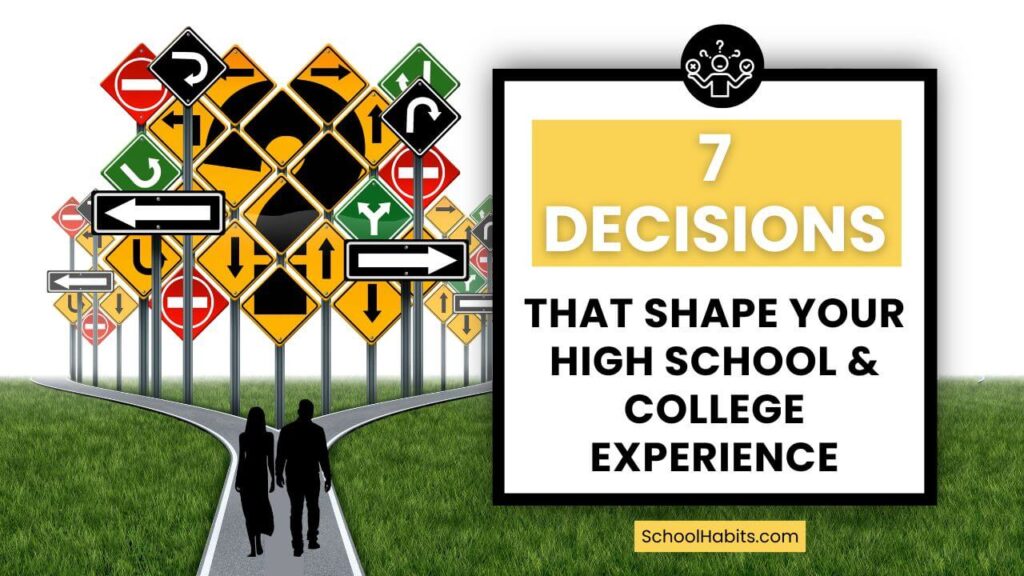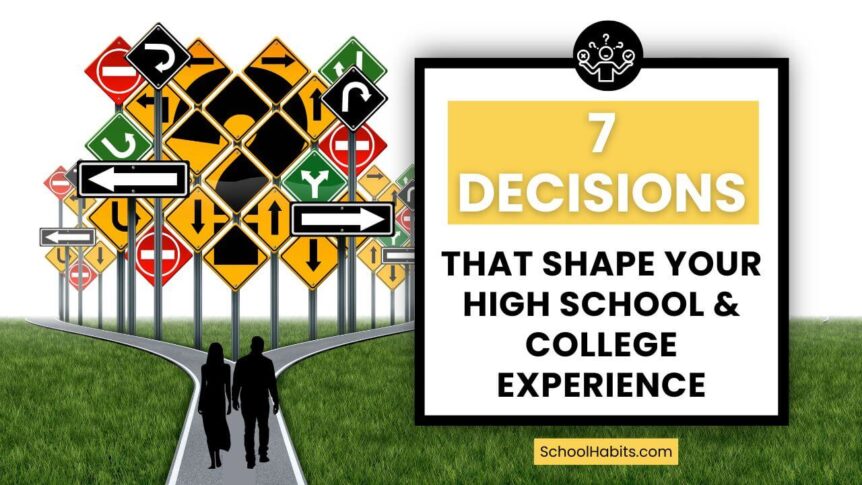
By Katie Azevedo, M.Ed.
Throughout high school and college, you’ll make many decisions that impact not only your school experience but the kind of life you’ll live (yikes!).
Some decisions will be significant, such as choosing which college to attend. Other choices will be more subtle, yet will have the potential to be equally important in the long run.
In this blog post, I unpack seven decisions that will shape your high school and college experience. If you are a high school or college student, it’s my strong suggestion that you consider all seven of the following decisions with care.
7 Decisions That Will Shape Your High School and College Experience
1. How You Spend Your Time
Your time is your most valuable asset. It’s also the one thing you’ll never get more of. Therefore, how you spend your time in high school and college can impact not only your transcript and academic outlook but also your general happiness.
When considering how to spend your time in high school and college, it’s important to find a balance between your current happiness and your future goals.
You’ll need to consider whether to spend your time working, obtaining an internship, playing sports, joining extracurricular activities, or all of the above.
Pro Tip for High School Students: The activities you do in high school contribute to the strength of your college applications. For example, if you’re planning to attend a business school, you’ll need to get involved in high school activities that prove to colleges your commitment to business. Start thinking about your college plans in high school so you can design your high school activities to support your college goals.
Pro Tip for College Students: Internship experience is a valuable addition to your student resume. Your college career center can help connect you with internships for summer and winter breaks, as well as shorter internships that run just a few weeks.
2. Who You Spend Your Time With
The people you choose to spend time with influence every part of your life. They influence your habits, mindset, choices, and even potential opportunities.
I’m not sure how true this saying is, but there’s a common expression that “we are the average of the five people we spend the most time with.”
Even if that’s not scientifically accurate, it’s a good mental practice to think about the five people you spend the most time with and consider their influence on you.
As we move from middle school to high school to college and beyond, we will outgrow people. This is normal. We outgrow people for many reasons – one of which is that a person may no longer bring out the best in us.
Choosing who you surround yourself with is a decision that will shape your high school and college experience and the rest of your entire life.
Pro Tip for High School Students: Finding a group of friends can be challenging, especially with social pressures to conform and partake in activities you don’t want to do. Choose friends who don’t make you feel bad for being yourself.
Pro Tip for College Students: If you’re living in a college dorm, your roommate is going to be the person you spend the most time with. If your roommate isn’t working out for you, change roommates.
3. Your Academic Priorities
Another significant decision you need to make in high school and college is how to design your transcript. Not all classes are created equal, and some classes are better than others for reaching your future academic and career goals.
What do you want to prioritize academically? Do you want a rigorous transcript with advanced placement courses that pave the way to college? Or do you want to take less challenging courses that fuel your personal interests? Do you want to take courses that build trade skills? These are all questions you need to think about.
Too many students I work with just take whatever classes their guidance counselor tells them to take. Or, they just take the courses their friends are in. This is not the right approach to designing your transcript. This is your life, not your guidance counselor‘s life or your friend’s life. Your life deserves time and attention and planning.
Pro Tip for High School Students: Meet with your guidance counselor at least quarterly and be transparent about your college goals. Don’t just accept the courses that appear on your transcript without engaging in meaningful conversation with your guidance counselor first.
Pro Tip for College Students: Meet with your academic advisor at least quarterly to ensure you’re on the right track. It’s also smart to form connections with people in the industry you want to break into. Ask these people what courses they took in college that turned out to be valuable in their careers.
Of course, the most valuable course you could ever take is SchoolHabits University.
4. How You Handle Challenges
Challenges are inevitable. You’ll face roadblocks to every single goal you ever set for yourself. The point is not to avoid these challenges (because we can’t); rather, the point is to determine how you’ll handle these challenges.
Essentially you have two choices: you can let challenges defeat you or you can use them as opportunities to build resistance and problem-solving skills.
I fully understand how that previous sentence sounds vague and generic. But I’m dead serious.
Mindset is one of the most powerful tools we have, and choosing a healthy mindset toward challenges is one of the top seven decisions that will shape your high school and college experience.
How are you going to handle a bad grade on a test? Are you going to blame the teacher or are you going to find better ways to study?
How are you going to handle being rejected by your first-choice college? Are you going to sulk and withdraw your other applications in self-pity, or are you going to attend your second-choice college and give it everything you have?
Pro Tip for High School Students: Handling challenges with resilience can be easier with a good support system. That’s why it’s so important to decide who you’re going to spend time with, which was decision two.
Pro Tip for College Students: Building resilience in college prepares you for the inevitable obstacles you’ll face in your career. Consider college failures practice for the bigger ones.
5. How You Organize Your Day
I already emphasized how important your time is, as it’s your most valuable asset. In that same vein, how you spend your day adds up to how you spend your life.
Optimizing your time involves having an organization system that keeps you on track, focused, and spending time on the right things.
The key decision you’ll need to make in high school and college is how you intend to keep track of assignments, deadlines, appointments, and other time-based obligations.
For most students, this includes using a digital calendar, a task management system like a paper planner, and even simple to-do lists. If you’re in high school or college, it’s time to cut the bologna story that you are the only person in the universe who doesn’t need to write things down. Yes, you do.
Pro Tip for High School Students: If you’re sick of people telling you that you need to get better at managing time, the reality might be that you simply don’t know what that means. Here’s my simple tutorial called What is time management really. Start there.
Another critical tip for high school students is to stop using your learning management system to track your assignments. That’s just the place where you find assignment materials and submit your work. You need an external location like a planner that allows you to add study sessions, micro tasks to larger projects, and other tasks not assigned by your teachers.
Pro Tip for College Students: Here are two of my best tutorials for managing a college schedule, including 5 tips for maximizing your no-class day, and 21 productive ways to use your time between college classes
6. How You Organize Your Digital Life
So much of our academic and career lives exist in the digital space. If you don’t have a system for organizing your digital assets, you’re going to be left in the dust.
As a student, you need a simple folder system for organizing your essays, documents, PDFs, and other materials related to your classes. You’ll also need an email organization system like this one.
But beyond school, there are endless other types of information you’ll be responsible for managing. I recommend Google Keep or Apple Notes for keeping track of information like contacts, books you want to read, shows to watch, goals, recipes, etc. Here are 10 lists every student should have.
Pro Tip for High School Students: At the end of each of your four high school years, put all of your digital files into a single folder. Name the folder with the year. When high school is over, you’ll lose access to your high school digital storage system, such as Google Drive. Before you graduate, you’ll want to transfer ownership of each of your four school-year folders to your personal account.
Pro Tip for College Students: The above pro tip for high school students also applies to you. Additionally, I recommend naming your digital files with a naming convention that you use throughout college. The most practical naming convention for most students is [the name of the document] + [the name of the course].
7. How You Define Success
One of the most important decisions you’ll ever make as a student is how you define success. Success looks different for everybody, and getting clear about your own personal definition is critical to making the right choices in high school and college.
It’s okay to have more than one definition of success. What’s important is that you have clarity around this idea, and that you don’t wing it. You’re too important to wing things like that.
Will you focus on external indicators of success like awards, grades, and achievements? Or will you focus on less obvious indicators of success such as personal growth, knowledge acquisition, skill development, and happiness?
Again, it’s okay if your definition of success includes all of the above, but you need to be transparent with yourself about your criteria.
Pro Tip for High School Students: Many students in high school define success by the college they get into. This is not a good approach. I’ve seen many students get into Ivy League schools and not be successful. On the other hand, I’ve seen many students achieve monumental victories at state universities. Do not define success by the “brand” of your college.
Pro Tip for College Students: Success in college is really about skill development. For example, if you’re going to college to become a marketing director, then success is measured by the strength of your marketing and management skills. If your definition of success does not include how well you learn the material you’re going to college for, then you’re setting yourself up for disappointment.
Final Notes About Making Decisions That Shape Will Your High School and College Experience
In this blog post here and in the podcast episode below, I share some strategies and frameworks for making decisions. You may find those resources helpful as you navigate some of the choices above.
But also know that decision-making involves listening to your intuition and avoiding impulsive choices.
If making any of the above seven decisions stresses you out, just remember that while not all decisions are reversible, you’ll always have the opportunity to pivot if needed. Nobody makes perfect decisions all the time. The goal of this blog post is to encourage you to start thinking about these decisions early so that you don’t have to make them under pressure or regret not planning early enough.

